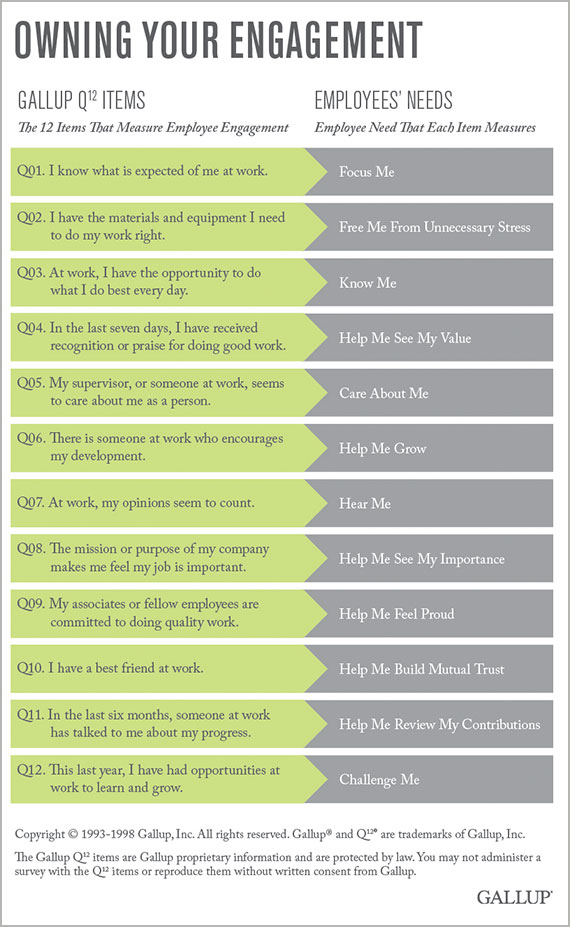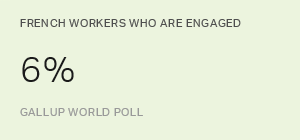Story Highlights
- 30% of U.S. employees and 13% of workers worldwide are engaged
- Being engaged links to personal and organizational performance
- Employees can use their strengths to improve their engagement
Engaged employees stand out because they're relatively rare. Gallup finds only 30% of all U.S. employees -- and a mere 13% of workers worldwide -- are engaged in their jobs.
Organizations, leaders, managers and teams all have a hand in supporting engagement. Managers, in particular, account for up to 70% of the variance in employee engagement across business units. Engagement levels tend to fluctuate substantially from team to team and from person to person within the same team.
All this variation points to one important factor of engagement that most companies tend to overlook: Unless employees assume some measure of responsibility for their own engagement, the efforts of their organizations, leaders, managers and teams may have a limited effect on improving engagement.
Engagement Is Personal
Though managers have the biggest impact on their team members' engagement, many managers are unwilling, unable or unprepared to motivate and engage their employees. Gallup finds that 10% of the population have a high level of talent for managing others, and 18% of current managers are a part of this group. If eight out of 10 managers aren't very motivating to work for, employees who are looking for a more fulfilling experience at work might want to take a more active role in nurturing their own engagement.
Employee engagement is the degree to which employees are involved in and enthusiastic about their work and workplace, which Gallup measures with its Q12 employee engagement survey. The Q12 survey items are written from a first-person perspective -- "I know what's expected of me ..." and "I have the materials and equipment I need ..." -- reflecting the highly personal nature of engagement. Ultimately, the survey reveals whether employees feel that their workplace meets their emotional needs.

What It Means to Be Engaged
Engaged employees begin the day with a sense of purpose and finish it with a sense of achievement. They consistently bring high levels of determination, tenacity, energy and resilience to everything they do. They are dedicated to their jobs, and it shows in their enthusiasm, inspiration and pride in their work. They become easily engrossed in their roles, and time flows quickly for them when they are at work.
In contrast, employees with low engagement dread going to work. Their interactions with coworkers are more negative than positive, and they sometimes treat customers poorly. They also speak poorly about their company to friends and family, achieve less on a daily basis and have fewer creative moments at work.
Engaged workers have a vastly more positive workplace experience, and this translates into real results for their organization: Engaged employees and teams are more profitable, productive and customer-focused, and they have lower turnover and quality defects, among other vital outcomes. And Gallup has found that engaged employees have higher well-being, healthier lifestyles and better health outcomes than their not engaged and actively disengaged counterparts. Clearly, engagement is a win-win situation for both employees and their organization -- and it's a two-way street.
Engagement Is a Choice
There's no such thing as a stress-free workplace. Employees in every industry and every type of role often face hurdles and negativity when they come to work -- and that includes employees like you. But you have a choice in how you respond to daily challenges, and if there's nothing else you can change about a situation, at least you can choose your attitude and approach.
As you embark on your own engagement journey, the following are some specific steps you can take to stay focused on your engagement goals:
Define your own engagement. Using the Q12 as a guide, assess areas where your engagement is strong and areas where it is weak. Identify the most and least engaging moments in your day, as well as what leads up to those moments. Think about how you work best and what conditions set you up for success. Consider the habits -- good and bad -- that contribute to or chip away at your engagement. You can refer to the survey questions and clarify what needs to happen for you to give the highest rating to -- or strongly agree with -- each engagement item.
Use your strengths to form positive engagement habits. Establishing positive, consistent habits at work can help you change your environment and create higher personal engagement. Finding ways to enliven mundane tasks or do more of what you enjoy doing at work can increase your sense of job fulfillment. So can changing a cynical attitude to a more open one. A great starting point is to use your areas of strength to hone in on what you naturally do well and apply those strengths in your role every day. Strengths can accelerate the development of good work habits and lead to higher engagement. They can also serve as a buffer against stress and negative emotions.
Build an action plan for sustained personal engagement. Read the Q12 items carefully and think about what it would take for you to strongly agree with each item. Once you know the answer, think about the strengths you can use to get there, and then create a personal engagement plan. You don't have to try to do everything in your plan at once -- even small steps will lead to big results. Focus on one or two Q12 items at a time and come up with actions that will increase your engagement in these areas.
The plan will give you a framework to build and rely on, even in unpredictable or challenging circumstances. You can use your strengths to help you achieve your plan, and visualize the positive results you will experience when you reach your goals. You also can share your plan with others. They can help keep you accountable, and you might inspire them to take action on sustaining their own engagement.
Be accountable to yourself for your success. Take responsibility and empower yourself by setting measurable, realistic goals and staying focused on and heading in the right direction to attain them. You will be successful because of who you are, not who you aren't. By leaning on your unique talents and strengths, you can make the most of each day at work, and engagement will follow. And be sure to celebrate your achievements and keep setting the bar higher.

